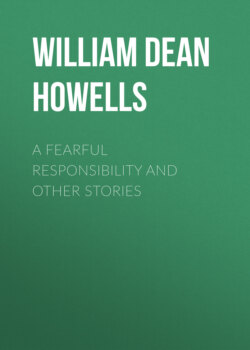Читать книгу A Fearful Responsibility and Other Stories - William Dean Howells - Страница 9
VI.
ОглавлениеThe next day was Sunday, and in going to church they missed a call from Hoskins, whom Elmore felt bound to visit the following morning on his way to the library, and inform of his belief that the enemy had quitted Venice, and that the whole affair was probably at an end. He was strengthened in this opinion by Mrs. Elmore's fear that she might have been colder than she supposed; she hoped that she had not hurt the poor young fellow's feelings; and now that he was gone, and safely out of the way, Elmore hoped so too.
On his return from the library, his wife met him with an air of mystery before which his heart sank. "Owen," she said, "Lily has a letter."
"Not bad news from home, Celia!"
"No; a letter which she wishes to show you. It has just come. As I don't wish to influence you, I would rather not be present." Mrs. Elmore slipped out of the room, and Miss Mayhew glided gravely in, holding an open note in her hand, and looking into Elmore's eyes with a certain unfathomable candor, of which she had the secret.
"Here," she said, "is a letter which I think you ought to see at once, Professor Elmore"; and she gave him the note with an air of unconcern, which he afterward recalled without being able to determine whether it was real indifference or only the calm resulting from the transfer of the whole responsibility to him. She stood looking at him while he read:
Miss,
In this evening I am just arrived from Venise, 4 hours afterwards I have had the fortune to see you and to speake with you—and to favorite me of your gentil acquaintanceship at rail-away. I never forgeet the moments I have seen you. Your pretty and nice figure had attached my heard so much, that I deserted in the hopiness to see you at Venise. And I was so lukely to speak with you cut too short, and in the possibility to understand all. I wished to go also in this Sonday to Venise, but I am sory that I cannot, beaucause I must feeled now the consequences of the desertation. Pray Miss to agree the assurance of my lov, and perhaps I will be so lukely to receive a notice from you Miss if I can hop a little (hapiness) sympathie. Très humble
E. von Ehrhardt.
Elmore was not destitute of the national sense of humor; but he read this letter not only without amusement in its English, but with intense bitterness and renewed alarm. It appeared to him that the willingness of the ladies to put the affair in his hands had not strongly manifested itself till it had quite passed their own control, and had become a most embarrassing difficulty—when, in fact, it was no longer a merit in them to confide it to him. In the resentment of that moment, his suspicions even accused his wife of desiring, from idle curiosity and sentiment, the accidental meeting which had resulted in this fresh aggression.
"Why did you show me this letter?" he asked harshly.
"Mrs. Elmore told me to do so," Lily answered.
"Did you wish me to see it?"
"I don't suppose I wished you to see it: I thought you ought to see it."
Elmore felt himself relenting a little. "What do you want done about it?" he asked more gently.
"That is what I wished you to tell me," replied the girl.
"I can't tell you what you wish me to do, but I can tell you this, Miss Mayhew: this man's behavior is totally irregular. He would not think of writing to an Italian or German girl in this way. If he desired to—to—pay attention to her, he would write to her father."
"Yes, that's what Mrs. Elmore said. She said she supposed he must think it was the American way."
"Mrs. Elmore," began her husband; but he arrested himself there, and said, "Very well. I want to know what I am to do. I want your full and explicit authority before I act. We will dismiss the fact of irregularity. We will suppose that it is fit and becoming for a gentleman who has twice met a young lady by accident—or once by accident, and once by his own insistence—to write to her. Do you wish to continue the correspondence?"
"No."
Elmore looked into the eyes which dwelt full upon him, and, though they were clear as the windows of heaven, he hesitated. "I must do what you say, no matter what you mean, you know?"
"I mean what I say."
"Perhaps," he suggested, "you would prefer to return him this letter with a few lines on your card."
"No. I should like him to know that I have shown it to you. I should think it a liberty for an American to write to me in that way after such a short acquaintance, and I don't see why I should tolerate it from a foreigner, though I suppose their customs are different."
"Then you wish me to write to him?"
"Yes."
"And make an end of the matter, once for all?"
"Yes—"
"Very well, then." Elmore sat down at once, and wrote:—
Sir—Miss Mayhew has handed me your note of yesterday, and begs me to express her very great surprise that you should have ventured to address her. She desires me also to add that you will consider at an end whatever acquaintance you suppose yourself to have formed with her.
Your obedient servant,
Owen Elmore.
He handed the note to Lily. "Yes, that will do," she said, in a low, steady voice. She drew a deep breath, and, laying the letter softly down, went out of the room into Mrs. Elmore's.
